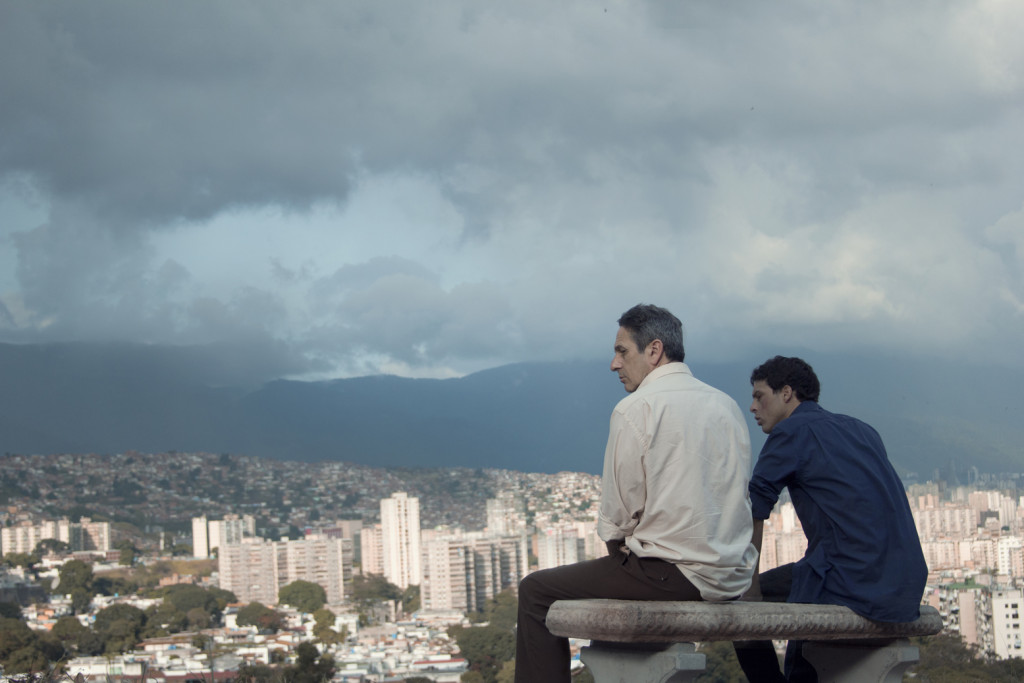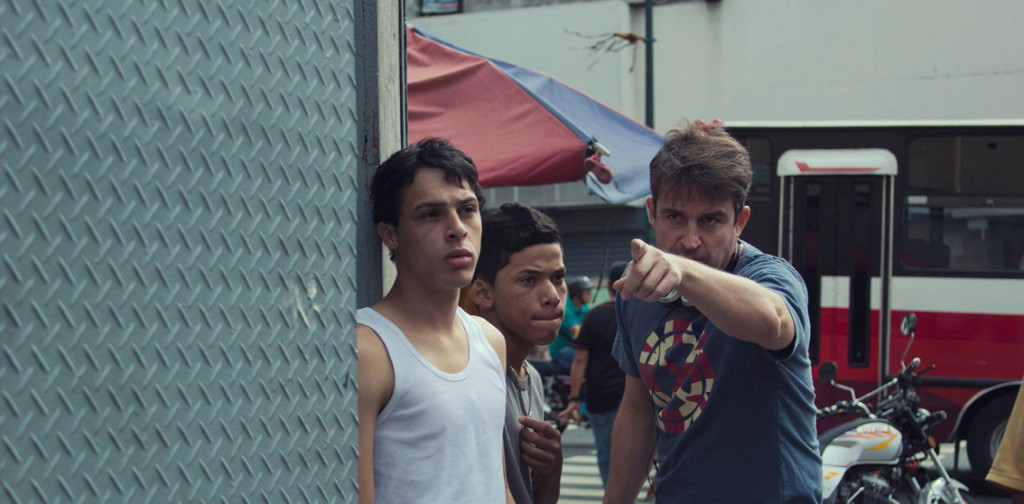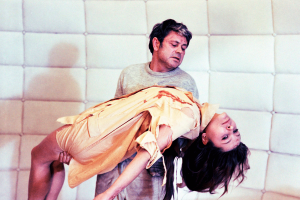The gods are just and of our pleasant vices
Make instruments to plague us.
William Shakespeare, King Lear, Act V, Scene 3.
Introduction
Our fourth guest to Actos Diversos is writer Juan Muñoz-Tébar. He holds a degree in Literature (Universidad Central de Venezuela) and a Master’s in Creative Documentary (Universidad Autónoma de Barcelona). He has been an editor at the Banco del Libro, a comedy librettist for radio and television, a documentary screenwriter, a researcher in the Spanish Philology Department of the Universidad Autónoma de Barcelona, and a professor of documentary film for children. He currently directs and writes scientific videos for a digital publishing house, and at night he writes a novel.
For this publication, Juan offers his reading of Lorenzo Vigas’s film Desde allá [From There], to be released in Venezuela and the rest of Latin America in 2016. In his text—which does not reveal any information that may threaten the curiosity of those who are yet to see it—one feels that the film is assembled and deconstructed within a complex fabric of actions and vindications that stem from precariousness, money, dependency, desire, violence, and love. We feel that, as part of a social body, we are exposed to others, and at the same time we are moved by the uncontrollable drives that come from there, from that distant interior that beckons love and death, vulnerability.
Nathalia Manzo
Desde Allá: What is told with simplicity
Emotions are not dumb. Honesty is not rude. Silence is not selfish. Friendship is not traitorous. Anger is not legislated. Desde allá, the film by Lorenzo Vigas, is a portrait of truisms and contradictions that evaporate too quickly in Venezuela. It is normal for us that obvious things lose their weight when they are overdramatized; we know that, by audiovisual tradition, they are the substance of telenovelas, and that, like it or not, we always find out that someone is sad because they announce it: I am sad (and, on top of everything, they cry). Desde allá, on the other hand, points the other way. It looks directly at intimacy, emptying it of explanations, and tells a story of urgent love, without fuss or imposture: a simple story that reflects the present of the country and suggests that, in many ways, Venezuela never changes, because so far it only knows how to exaggerate itself.
Director Lorenzo Vigas does not cover, or pretend to cover, any new ground, and yet his film tells the story of two people who decide to tread all possible grounds and see what happens. It boasts an impeccable script and a fade-to-white ending that one welcomes when it comes to glimpsing at the faces of other viewers: immobile, their eyes wide and their mouths closed, as if they had just read a well-written sonnet. They are left without excess or lack; the artifices make sense, the rhythm is ruthless, and every element—including emotions—is in its proper place.
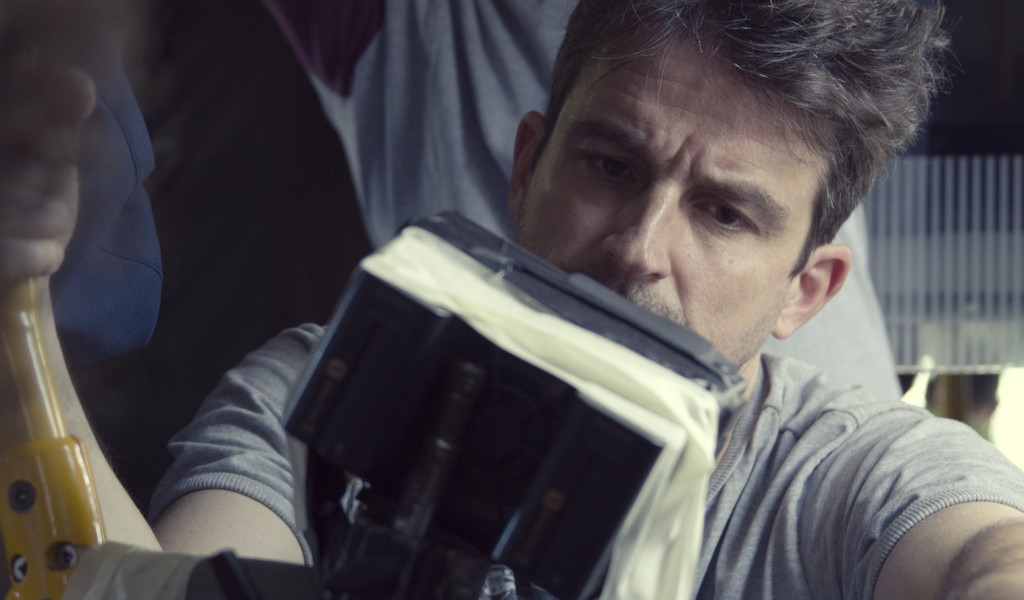
Like any Venezuelan film, this film obeyed the commandments of local life, where economy and crime impose real and harsh rules (for instance, budgets had to be updated at the end of each shooting day, inflation dixit). One can breathe the randomness of Venezuelan life and its precarity from the beginning to the end of Desde allá: they push the film forward and give it kamikaze force. It feels as though Vigas went all in, jumped into the void against all odds, and rose with his skull intact. The truth is that his chances to wind up badly beaten were high, especially considering that this was his first film and that it is an actor’s film. What I mean is that it is not necessarily enough to have a Guillermo Arriaga-advised screenplay and the will to do a good job if your film is based on the tension between two actors. The casting and the quality of the performers are very important, of course, but directing them well is vital and marks the difference between an auteur fiasco and a well-told tragedy. Vigas, discreet and uncompromising, rips out the entrails of his actors and makes them perform magic without pyrotechnics. So, a surprise, a discovery, or whatever you want to call him: this is a new director who knows how to direct, and who took the risk of telling a very uncomfortable story.
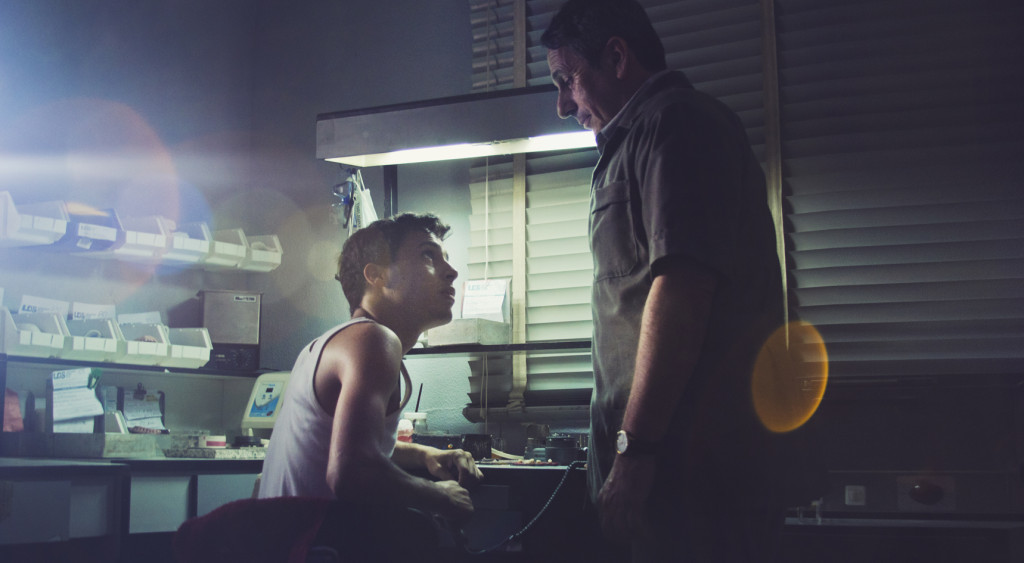
The plot of Desde allá has already been explained, or rather, gutted to the point of fatigue by the media that covered the Venice Festival, where it won The Golden Lion, or at the Festival of Havana, where it just received the Choral Award for Best Prima Opera. A superficial reading reveals that the film, set in Caracas, is about the homosexual relationship between a middle-aged upper-middle-class man (Armando) and a young delinquent (Elder) who has barely a bed to sleep on. This relationship, which begins motivated by perversion, violence, and money, ends up giving way to love and a strange sense of company… That is, there is something of modern fable in it, but with a result so real and stark that it suffocates the moral of the story. The film, which renounces any kind of sordidness, does not aspire to lecture anyone. There is simply no good or evil in a rotten society.
Seasoned Chilean actor Alfredo Castro flew to Caracas to play Armando, an insignificant denture craftsman who enjoys a comfortable life. Invisible, he moves in broad daylight as if walking in the dark. The outside world is to Armando a great blur (the good work of Sergio Armstrong, director of photography) where he can get teenagers in exchange for money: he pays them to undress in front of him so he can feel, for a while, that his immaterial body exists and is tangible. Alfredo Castro gets into the skin of this affection-orphaned fifty-year-old: contained in desperation, so fragile, oblivious, and repulsive that if he has not drowned in his own shadow it must be thanks to rage and monotony. A traumatized man, filled with resentment towards his father, with a dark past that need not be explained, reminiscent of a quote by Oscar Wilde: «What Dorian Gray’s sins are no one knows. He who finds them has brought them.” And despite all this, Armando is not introduced in the film as a strange or special man. Rather, he is someone who may well be nearby: a quiet, well-shaved neighbor that says good morning and goes out into the street with horror, convinced that only violence can change his life.

And the violence of Caracas responds with Elder, played by Venezuelan actor Luis Silva. If you want to see how a thug can be humanized without betraying or ridiculing himself, being capable of showing both unsuspected strength and fragility, here you have it. The hitherto-unknown Luis Silva has been fairly rewarded in Biarritz and San Sebastián, and not just because he stood his ground opposite a great Alfredo Castro. Silva ignores the vertigo and walks like a cat on the edge of the abyss. His performance is passionate and truthful, and his presence onscreen is so breathtaking that he ends up devouring the entire movie. Elder is the leader of a band of criminals who don’t miss the opportunity to split Armando’s face; a poor boy meeting a rich man and never thinking about being Cinderella. His life is reduced to survival, and therefore to using people like Armando. So there are no promises or beautiful declarations, romance is not even in order. Nor is there any complacency when portraying social classes or homosexuality. The story simply leads Elder and Armando to share their scars and recognize the same affective deficiencies in each other. They love each other and, of course, a love based on lack is almost by definition incomplete and destructive.

Finally, I would like to point out that there is no soundtrack in Desde allá (don’t be fooled by the trailer). The absence of incidental music and the magnificent sound production envelop the film in verisimilitude and give soul to many of its imperfections. One can hear people, birds, and motorcycles passing by. And one can also hear the silence, the fear, and the desire to live. In this movie, I repeat, everything is in its right place. With its calm and haste, Caracas sounds like Caracas, uninterrupted and wild as it has always been and will be.
